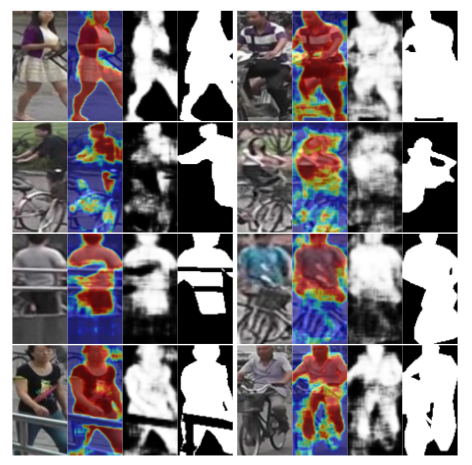This repo investigates how to utilize mask data in reid task. Several strategies are taken in our experiments, and evaluated on Market-1501 dataset. Our baseline is based on a strong baseline here, and use Resnet50 as base model.
Strategies of applying mask data:
- Concatenate mask and RGB image to form a new image with 4 channels.
- Soft and hard attention proposed in MGCAM.
- Spatial and channel attention proposed in CBAM.
Before starting running this code, you should make the following preparations:
- Download the Market-1501 dataset.
- The mask data are avaliable here.
- Install MXNet. This repository is tested on official MXNet v1.3.0.
- Modify related settings in
.ymlfiles first, and train the model:
python train.py/train-mask.py/train-cbam-att.pyThese three files corresponding to experiments: reid baseline, 4-channel soft/hard attention and spatial/channel attention. More details can be found in the files and their .yml files.
-
Then use
eval.pyto extract features for specific testing set and evaluate the models. -
R1 performance with RGB/RGBM input and soft/hard attention
| baseline | soft mask | hard mask | |
|---|---|---|---|
| RGB | 91.1 | 90.9 | 90.9 |
| RGBM | 92.4 | 92.6 | 92.6 |
- R1 performance with spatail and channel attention
| baseline | channel | spatial | spatial+channel | |
|---|---|---|---|---|
| RGB | 91.1 | 91.5 | 90.3 | 91.8 |
| RGBM | 92.4 | 93.6 | 91.2 | 92.4 |
- This repo also include the codes for evaluating the occlusion in reid task, i.e.
eval_verify.py, and related list processing files inutilsdir. - The attention map of RGB-soft mask model are displayed below. Four image are taken as a group, in which they are arranged as RGB original image, GCAM visual map, attention map and mask ground truth.
